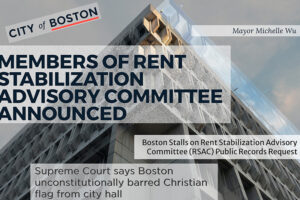Boston Mayor’s Rent Control Leaked
2023-02-02 Business Update - Boston Mayor's Rent Control Leaked
Resource Person:
Douglas Quattrochi - Doug
[Start 0:00:00]
H! My name is Doug Quattrochi. I’m the executive director of MassLandlords. I’m here to give you a business update on rent control, what the mayor of Boston is proposing based on what the Boston Globe has reported. This is not a panic-and-sell-your-properties moment. We just want to let you know that we’re working on this. We’ve got multiple means of addressing it, and this is just to let you know kind of where the city is and what we’re doing.
This is the story we’ve been following for over a year now. Mayor Wu of Boston announced the Rent Stabilization Advisory Committee in March 2022, a bunch of people on it, mostly renter advocates. There are a couple of developers, and there’s one landlord, really more of a commercial owner, has a pizza shop. We haven’t seen the proposal that they have produced in writing, but we have seen basically the leak discussion of what they’re about to propose, according to the Boston Globe.
Unsurprisingly, because there were no landlords on the committee, they’ve produced kind of [unintelligible 0:01:03] anti-landlord plan. Their proposal is expected to be either you can raise rents by 10 percent max or inflation plus 6 percent, whichever is lower. So if inflation is 1 percent in a year, you can raise rents by 1 percent plus 6 percent to 7 percent in a year. Or if inflation is like it is now, 7 percent, and your market is doing something more, so you’re locally appreciating faster, you can only raise your rents at 10 percent. It wouldn’t keep pace with the market. Of course, if inflation is ever higher like what we saw in the late ’70s or early ‘80s, you’d be crammed down, so over time, you would expect not to be able to sustain your business, so that’s a real problem.
On top of this, the mayor is enforcing rent control with just cause eviction, so you can’t really enforce a rent control regime without preventing landlords terminating tenancies at will. If a landlord can terminate a tenancy at will, he will just get a new tenant in, and there is new rent. Just cause eviction basically creates estates for life where you can’t evict a renter unless they violated the rental agreement multiple times in very serious ways.
The mayor is using a divide-and-conquer strategy, so all developers are exempted. Anybody who builds something new doesn’t have rent control for the first 15 years of operating, and of course, by then, the developer is gone and the long-term owners who live in their multifamily buildings in the city would also be exempted. Of course, it’s not the core of housing providers in Massachusetts or in Boston. There are lots of folks who don’t live in their buildings and lots of units that would be subject to rent control.
Conspicuously absent from the leaked plans is any discussion of means testing. That means it doesn’t look like the City of Boston has figured out how to verify rent control goes to low-income households. It’s a real problem, and as a matter of fact, it’s the reason why Cambridge is the test case because Cambridge had rent control. We had this terrible inverted situation. Let me show you what I mean.
In 1985, Heikki Loikkanen, an economist at the Academy of Finland, predicted that landlords should rationally want to hold their units vacant longer under rent control, waiting for the perfect applicant to come along because a landlord can’t be sure to keep in pace with inflation and can’t be sure to even getting permission to evict, let alone navigating what is usually a very costly and terrible process for both the landlord and the renter. He predicted this. It’s called availability discrimination, and this was proved to have taken place by David Sims’ 2007 study in Cambridge.
We repealed rent control by statewide ballot initiative in 1994, gave us his great test case where we can see an instant before and after, and Sims shows that although about 22 percent of cities that had a rent control system, predominantly Cambridge, were residents of color, only 8 percent of rent-controlled units went to renters of color because landlords were holding units vacant longer, waiting for the perfect applicant with high income and perfect credit and so on. In America and in Massachusetts no less, we have had and still have an unfair black-white wealth gap due to systemic racism and it’s just really hard for everybody to have equal opportunity on the rental application.
What we actually saw in Cambridge—this is real data—is that rent control units went disproportionately to people who are well off and those folks who are unfairly disproportionately white. This is a real problem for the mayor because a lot of their advocacy in the city for rent control is coming from folks who want to increase racial equality in housing. it’s an important goal; it’s a goal we’re working towards, but the data shows rent control regimes don’t do this.
Another factor we really want the City of Boston to understand is the Cherry Sheet. Every town and city are funded by municipal revenue including real estate taxes, but then also there’s a lot of revenue paid into the state through other taxes and the state will pay that back to different towns to support schools, to issue unrestricted government grants, and do a whole variety of other things, pay for regional transit, and so on.
[0:05:08]
What we saw in 1994 when rent control was repealed was that when folks who had rent control wanted it, but folks who didn’t have rent control wanted it repealed because what Cambridge had done, to use Cambridge as an example, is the rent control regime had created a disincentive to invest. It lowered assessed values over decades. It reduced municipal tax revenue, and it therefore increased state aid to Cambridge artificially. All the surrounding wealthy towns were paying Cambridge for their failed rent control system.
If Arlington or other state reps and senators permit Boston to have rent control, it will directly reduce Cherry Sheet aid to those towns and cities that don't have rent control because Boston will reduce its assessed values and will need increased state funding under the formula.
These two things maybe you don't know, so that’s why we’re trying to let folks know about it, but of course as a housing provider, you know rent control is the number one issue on our policy priority survey. We all know it decreases the incentive to invest, so it decreases housing quantity. It decreases housing quality. It has this unintended disparate impact on the basis of race. There are a lot of issues with rent control.
Our proposal at the moment to the city council is you can have rent control but use the current law. This is something a lot of people don’t realize, but when rent control was repealed in 1994, that ballot initiative created General Law Chapter 40P and Section 4 grants an exemption where you can still have rent control today. You don’t need permission from the legislature. As a town or city, you enact your own rent control regime. It can have just cause eviction in it, and if you’re going to restrict what a renter can pay in rent, you have to reimburse the owner for the difference between the controlled rent and the market rent. Basically it creates a form of rental assistance which we’re all familiar with.
There are lots of renters in Massachusetts today, lots of our customers who don’t pay what the market rate department is. They pay what they can afford, and then subsidy comes in to make up the difference. We want the city council of Boston to know that the mayor’s plan, if it doesn’t take into account this Chapter 40P exception, the mayor’s plan is really off base.
This disparate impact issue is the major way in which we would litigate even enjoin against reinforcement of a rent control regime in Boston because the data from Massachusetts itself are so crystal clear that the rent control proposal the mayor is going for would have a racist disparate impact. It’s a really easy thing for us to imagine wining, and as a matter of fact, we’re already drafted the litigation not in the context of rent control, but there have been various other things towns and cities have done over the years that have not played fair and have had disparate impact. We’re basically ready to go with that litigation.
Lastly, litigation is going to come to Boston kind of sooner rather than later even if they don’t enact rent control because we have filed public records request with them, trying to understand the way the Rent Stabilization Advisory Committee came to be, and as a matter of fact, they did not comply, and the state even ordered them to comply, and they didn’t comply with the state order.
This is a really strategic litigation not directly related to rent control. I can talk about it once we get it filed or succeed in that, but basically we’re acting on this right away. If you want to learn more about rent control, learn why it really is so terrible. I encourage you to visit our site and watch Linda Levine’s presentation. She lived through it’ she cataloged what people experienced. These folks were ordered to jack up their house, and the owner died of a heart attack a couple of weeks after. Landlords were put in jail for holding the units vacant. Landlords were bankrupted for failing to follow rent control even though their renters were subletting at market rents. There was an awful lot of injustice.
Rent control, in its implementation, is not about helping renters. It’s about controlling housing. As housing providers, we want to be free to do our jobs, so that’s why we will oppose it strongly.
Thanks for your interest and paying attention to this. It’s important. We’ve got it covered, but we’ve got it covered because of your support so we’re going to need your support and we’re going to need the support of lots of owners as we go forward. We’ll keep you posted.
[End 0:09:25]





